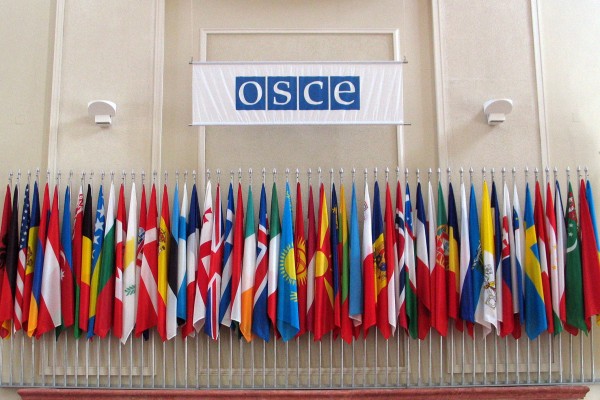Austria Stuck in a Dilemma at the OSCE
Austria may cause some controversy at the Parliamentary Assembly of the Organization for Cooperation and Security in Europe (OSCE) in Vienna by letting sanctioned Russian politicians enter the country and granting them visas. Moreover, of all days, the Parliamentary Assembly will be held on February 23 and 24.
 Austria May Cause Some Controversy at the OSCE by Letting Sanctioned Russian Politicians Enter the Country. / Picture: © OSCE / Mikhail Evstafiev (CC BY-ND 4.0)
Austria May Cause Some Controversy at the OSCE by Letting Sanctioned Russian Politicians Enter the Country. / Picture: © OSCE / Mikhail Evstafiev (CC BY-ND 4.0)
The OSCE Parliamentary Assembly, taking place in Vienna on February 23-24, puts the Austrian Foreign Ministry in a quandary: Some allied EU partners are said to have demanded behind the scenes that Austria, like the hosts Poland and Great Britain, should not issue visas to the Russian delegation, according to Kurier.
According to FAZ, the Austrian Foreign Ministry has already announced that it will not refuse the necessary visas to members of the Russian delegation, unlike the UK and Poland who did last year at OSCE events in their countries. The problem is that many of the Russian delegation members are under EU sanctions. The Russian delegation is said to include, for example, Deputy Duma Chairman Pyotr Tolstoy, who says he wants to bomb Ukraine back to the 18th century, and Leonid Slutsky, who called for prisoners of war from the Azov steelworks in Mariupol to be executed.
As reported by Kurier, The Austrian Foreign Ministry told the APA on Tuesday that the winter meeting of the OSCE Parliamentary Assembly traditionally always takes place in Vienna, so it is not an Austrian invitation. Austria has concluded an official headquarters agreement with the OSCE and is therefore obliged under international law to grant entry to the delegates of all OSCE participating states. The EU sanctions would provide for an exception to the entry bans for such cases. Permission to enter the country is solely for attending the organization's meeting. A visit to the ball would "represent a blatant misuse of the visa," the Foreign Ministry said.
The OSCE Ball
Attending the ball would constitute serious abuse. It can be assumed that this was also communicated to the Permanent Representative of Russia to the OSCE. It is unclear what options the Austrian authorities would have if the Russians took their chances. According to the Foreign Ministry, the agreement on the headquarters of the OSCE also expressly states that anyone who undertakes "acts incompatible with the headquarters agreement" will be asked to leave the country, according to FAZ.
As stated by Der Standard, the Ukrainian representative at the OSCE, Yevheniy Tsymbalyuk, expressed open criticism. He said that Russia has been ruining the organization "for years". It is to be feared that the Russian delegation will use the meeting for a “propaganda show”. Warnings are being issued from several quarters that the ball is being held in the Vienna Hofburg at the same time, which is being organized by the right-wing Freedom Party (FPOE) as a celebration of academic connections. With a friendship agreement concluded in 2017, the FPOE is close to the United Russia party, which supports President Vladimir Putin. The FPOE also criticizes the European sanctions policy.
Austria and the OSCE
The OSCE is based on the policy of detente in the Cold War between NATO and the then Warsaw Pact. After its end, the so-called Helsinki Process was consolidated in the organization based in Vienna. 57 states “between Vancouver and Vladivostok” belong to the OSCE. In addition to criticism of Austria, other participating States also expressed the view that the OSCE as a platform is currently not relevant because of the Russian aggression, but that this could turn out differently in the future. Various delegations are now examining whether to stay away from the Parliamentary Assembly entirely when the Russians are taking part, whether to take part under protest, or whether to leave the room when Russian participants speak.
Irrespective of the fact that the OSCE is based in Vienna, Austria's Foreign Minister Schallenberg has previously criticized the cancellation of inviting Russian participants to OSCE events. When Poland refused entry to Russian Foreign Minister Sergei Lavrov in December to attend the OSCE summit in Lodz, the ÖVP politician commented: "Well, I regret that and think it's a security policy own goal." Most recently, Schallenberg met in Kyiv to criticism when, in an interview, he called for a sense of proportion towards Russia. "We must not overshoot the mark, for example by introducing a visa ban for 144 million Russians," he said in Paris in mid-January.



